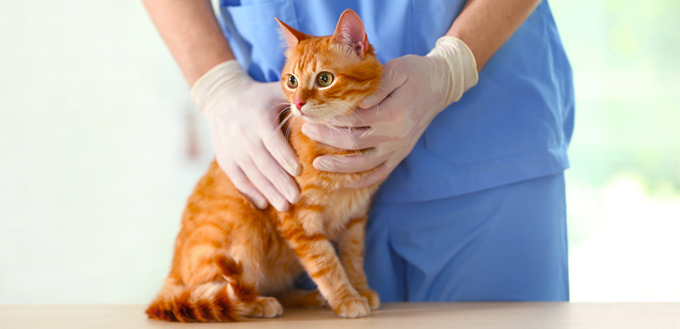Many pet owners struggle a little with the concept of neutering their cat; and even when they understand the importance of it, it can be difficult to know when’s best to take the plunge. Here, we’ll throw some light on the issue by explaining when cats can be safely neutered; what it involves; and why it’s so important.
When Should I Consider Neutering My Cat?
The earliest age from which a kitten can be neutered is between six to eight weeks. This is called pediatric neutering. It’s often an emotive issue for an owner, as it seems cruel to subject such a tiny kitten to surgery. But in fact, there is plenty of research to show that there are no proven ill effects, provided the cat is healthy and weighing at least two pounds at the time of the operation. Your vet can advise on individual cases.

But that is the absolute earliest; and by accident or design, neutering is often left till a little later in life. The ideal is to ensure that your cat is neutered before he or she reaches sexual maturity. That date can vary from breed to breed, and even whether the cat is an indoor or outdoor/ feral one, but it’s generally considered to have reached its adolescence by the age of six months.
For a family pet, the best age to have your cat neutered is around two to three weeks after they’ve had their primary vaccinations. These vaccinations begin for kittens at nine weeks, with a second injection around three to four weeks later. That means neutering generally takes place when the cat is between four and six months of age.
What Does Neutering Entail?
- For female cats, the ovaries and uterus are removed (called ‘spaying’), preventing pregnancy.
- For males, both testicles are removed (called ‘castration’). This removes the main source of testosterone, and after several weeks, they will no longer be capable of producing sperm.
Why Have Your Cat Neutered?
Female cats will generally first come into season around the age of six months, although it can be earlier. When you consider that a cat can have up to three litters of up to six kittens a year, you can see why neutering is important if you don’t want to be inundated with cats in a relatively short space of time!
You might think that neutering a male cat is not such a priority as of course, you don’t see the consequences of not doing so as immediately. But as a responsible pet owner, you’ll be helping to ensure that the growing population of unwanted cats doesn’t increase.
Other reasons are related to your pet’s personal safety. An un-neutered male is far more liable to wander further from home than a neutered one, because he has an instinctive drive to seek out a mate. So ensuring your cat is neutered will help keep him safer, from getting lost or involved in a fight with a car, for instance!
Cats that haven’t been neutered tend also to be more aggressive and will easily provoke or get into fights with other cats. That means for him, he’s more likely to suffer injuries, and for you, those vet’s bills may well mount up. This kind of cat fighting can also spread potentially life threatening diseases such as feline leukemia and feline immunodeficiency virus. Un-neutered males may also show more aggressive behavior towards their owners and will almost certainly spray smelly urine around the home.
And lastly, there is veterinary evidence to show that cats that have been neutered are far less likely to suffer health issues surrounding their reproductive organs in later life. This includes, for instance, testicular cancer in males and uterine cancers in females. Females are less liable to suffer from urinary tract infections (UTIs) and potentially life threatening conditions such as breast cancer and infections of the womb (pyometra).
You May Also Like: Cat Food For Urinary Tract Health
Is It Ever Too Late to Have Your Cat Neutered?
No, provided they are healthy enough to withstand the rigors of the operation. This means if you take in a stray adult cat or intend to adopt one from a pet shelter, it’s still worth doing if it hasn’t already been done.
You should be aware, though, that an adult male who has only been neutered later in life will probably still retain some of the instinctive behaviors he’s had for most of his life. This might include the tendency to wander further from home and marking his territory with urine.

How Do You Know Whether Your Cat Has Been Neutered?
If you’re thinking of adopting a stray that’s wandered into your backyard and stayed, you may wonder whether he or she has already been ‘done’. It’s easy to tell with a male, but a lot more difficult with a female.
For males, look for the testicles. These are positioned below the tail and the anus, and above the penis. If the testicle sack has been removed, it’s safe to say he has been neutered.
Spayed female cats don’t display anything like as clear a signal! Many feral cat programs will snip the ear if the cat has been neutered or tattoo a tiny blue-green mark near the incision site, but there’s no guarantee that that will apply to your new pet.
One clue comes from observing her behavior. Does she appear to come into season? Typical behavior here might be uncharacteristic loud yowling, rubbing up against furniture and lifting her rear into the air.
Vets can also shave a small patch of hair to look for the surgical scar – this will be located on the lower abdomen and may be less than an inch long, running in a head to tail direction.
However, the only definitive way is to conduct surgery to see if the reproductive organs are intact.
Is Neutering Safe for My Pet?
Neutering for either sex is a routine operation your vet will have carried out thousands of times before. It’s a relatively fast procedure, so your pet won’t be under the anesthetic for long. In most cases, you’ll be able to bring him or her home the same day.
Modern anesthesia is very safe for healthy cats and today’s pain killers are highly effective, meaning that your cat shouldn’t suffer much more than mild discomfort and will bounce back quickly after the operation. They may need to be kept indoors for a few days afterwards and may need to return to the vet’s office to have stitches removed, if dissolvable ones aren’t used.
But you should always feel free to discuss any concerns whatsoever with your vet, who will be more than happy to set your mind at rest. After all, the benefits to your cat, to you and to the feline population in general by far outweigh the disadvantages!
The contents of the www.mypetneedsthat.com website, such as text, graphics, images, and other material contained on this site (“Content”) are for informational purposes only.
The Content is not intended to be a substitute for professional veterinarian advice, diagnosis, or treatment.
Always seek the advice of your veterinarian with any questions you may have regarding the medical condition of your pet.
Never disregard professional advice or delay in seeking it because of something you have read on this website.
Sources:
- Spaying and Neutering, Cornell Feline Health Center
- When Should I Spay or Neuter My Pet?, American Animal Hospital Association
- Neutering Your Cat, International Cat Care
- Sorting the Science on Spay and Neuter Surgeries, Danielle Engel
Note: The advice provided in this post is intended for informational purposes and does not constitute medical advice regarding pets. For an accurate diagnosis of your pet's condition, please make an appointment with your vet.







